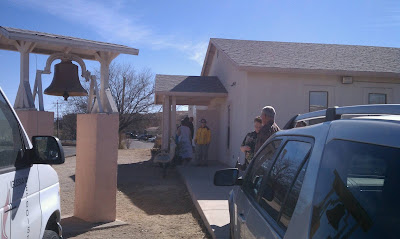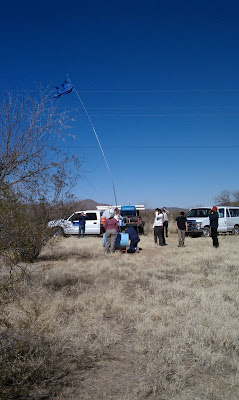I really appreciated all of the well wishes and prayers I received while I was gone and since I have returned. It helped me to feel connected with you even when I was a great distance away. I was asked to write about the impact this trip had on me, and what (if any) difference it will make in my ministry. I thought I would use those two questions to fuel this final reflection on my time in Arizona and Mexico.
IMPACT
I didn't have specific ideas about what we would be doing or how it would impact me before I went... this was a "learning" and "immersion/mission" trip in which I was traveling with other pastors I have gotten to know quite well over the past four or five years. I tried to be open to the encounter, and see what impact it would have on me as we traveled throughout the week, rather than having a preconceived notion about what we would see or what I believed about any particular situation. Here are some of my thoughts:
1. The issues of homelessness and immigration are simultaneously incredibly complicated and heartbreaking. There are so many interrelated, precipitating factors, my mind truly begins to spin. Any person that tries to say that either the cause or the solution is simple is (at best) misguided. We have a complicated history related to both topics, and things constantly shift and change with changing economic realities as well as political policies and procedures. The solutions are neither simple nor easy.
2. As we talked about in church yesterday (we addressed how Christians talk about 'hot-button issues'), issues are very different if we are talking about impersonal policies or hypothetical arguments instead of remembering that we are talking about real people and their lives! Perhaps the biggest impact from this trip comes from the encounters we had: homeless persons in Phoenix and the people in ministry with them, migrants from Mexico and Central America and the people in ministry with them, and the people of Arizona that are forced to confront this issue more than most people in our country. This is NOT a purely hypothetical issue, but lives and livelihoods are at stake among all of these folks.
3. I want to acknowledge the concerns people have about the different ministries we encountered. Perhaps none was as controversial (I have heard, both while on the trip and since I returned) as the ministries that provide water to migrants in the desert. Some people hold the view that providing water supports the system and encourages illegal crossings of our border. I have heard these concerns, but I have to disagree. After speaking with migrants (some had recently been deported to Mexico, while others were preparing to head north for the first time) and finding out about their stories, I don't believe there is anything that would deter them from risking their lives to go to the USA. For those that I talked with, it is a matter of survival for them and for their family. Part of the mission of the organizations that we engaged with is to deter people from crossing the desert by giving them accurate information about the treacherous conditions (Many of the "coyotes," or smugglers take advantage of the lack of education of the migrants and tell them things like, "Yes, Minnesota is just on the other side of the hill," when the truth is that they have to walk 3-5 days or more just to get to Tucson). In my conversations, telling them the truth didn't even matter. For them, their original decision to leave home was a matter of either sitting in their poor village down south and starving (or watching their family starve), or trying to do SOMETHING to make their lives better. Who is to say that if I was in their situation I wouldn't do the same thing? I don't know what I would do, but I doubt I would sit and do nothing. People may disagree, but I don't think giving water really factors into the decision of people to cross our border illegally. I also don't think it solves all of the immigration issues to drop water in the desert... It just keeps a few people from dying a terrible death.
Others were concerned that what we were doing is illegal when in fact, everything is done above board and is fully legal. No water is place without permission of the landowner or permits being obtained. In fact, many ranchers ask for the water containers to prevent water taps from being left on, and because it prevents other kinds of crimes. There is even a kind of peaceful coexistence between these ministries and the Border Patrol. The Border Patrol officers have a difficult job, and are by-and-large very professional. The people in ministry in the desert are trained about what is legal or illegal, and when to call the Border Patrol (if a migrant is in need of emergency medical attention, or asks to go home).
4. I have a few concerns that have arisen in my conversations about these challenging issues. Mainly, I have been taken aback at how some people refer to the migrants and undocumented persons as "those people." On this trip, I have been thinking a lot about the two things:
- The story/sermon illustration about finding babies in the river and jumping in to save them. After a period of time, someone begins to wonder about why the babies are in the river and goes upstream to stop the babies from entering the river in the first place.
- The Scripture passage from Matthew 25: 35 "For I was hungry and you gave me something to eat, I was thirsty and you gave me something to drink, I was a stranger and you invited me in, 36 I needed clothes and you clothed me, I was sick and you looked after me, I was in prison and you came to visit me.' 37 "Then the righteous will answer him, 'Lord, when did we see you hungry and feed you, or thirsty and give you something to drink? 38 When did we see you a stranger and invite you in, or needing clothes and clothe you? 39 When did we see you sick or in prison and go to visit you?' 40 "The King will reply, 'I tell you the truth, whatever you did for one of the least of these brothers of mine, you did for me.'"
5. I still have SO MANY QUESTIONS: Who is profiting from this current system (guns and money going south, and drugs and people coming north) and how can we begin to address that? How can we provide opportunities for people to enter our country legally to decrease the illegal crossings, while still keeping out the people that should be kept out? How do we help the people of Arizona with these issues instead of just forcing them to take care of all of the people getting funneled through their state to the rest of the country? How can we prevent the poor from being victimized? Many poor migrants are taken advantage of in many places (by the smugglers who sell them into human trafficking, hold them for ransom from relatives until money is obtained, by certain citizens that take advantage of their undocumented status to oppress them). These are not simple questions with simple answers. In fact, sometimes they seem so big it is easier to just ignore the questions. Please don't ignore these issues. That would only make things worse.
WHAT DIFFERENCE WILL THIS TRIP MAKE IN MY MINISTRY
Just as there are not easy answers to the solutions to these huge issues, it is not easy to answer the question about the difference this trip will have on my ministry. I think the importance of truly encountering people is vital in any faithful discussion. That prevents us from generalizing about others.
- "All liberals think ___________."
- "All conservatives will just say ___________."
- "All immigrants are lazy, freeloaders taking advantage of the system."
- "All immigrants are carrying drugs." (In fact, statistics show that 90% are "economic refugees")
I think this trip (just as previous trips to El Salvador, Guatemala, China, South Korea, the Gulf Coast after Katrina, etc.) reminds me that our ministry and our faith has to MATTER. When we gather in a community of faith, it can't be something we do for an hour each week, but it really must help us be better followers of Christ in the world! If we forget that our faith is about the real world, then we would truly become irrelevant.
I also see opportunities to make a connection between our church's sister church relationship with Buenas Nuevas Iglesia in El Paisnal, El Salvador and Spokane by looking really intentionally at how people get from there to here. I don't know exactly what that connection might look like, but I am curious to have the conversation... Many people in our community, as well as many people from El Salvador have crossed the desert near where I was last week. We heard Pablo sing a song in the desert written about a 14 year old girl from El Salvador who died in the desert in order to save her 9 year old little brother so he could meet up with their parents in California (I would love to play that song for our sister church team). One man from Tucson who works with Humane Borders told me that he wants to come with our congregation to El Salvador in 2012. What an amazing connection that would be?!
If you made it all the way to the end, I am impressed! I really intend this reflection to be the beginning of a conversation, and not a one-way declaration. I pray for our understanding to deepen (of each other, of the plight of the migrants) and for God's grace to help us find the way forward.
Prayerfully,
Gregg
























































